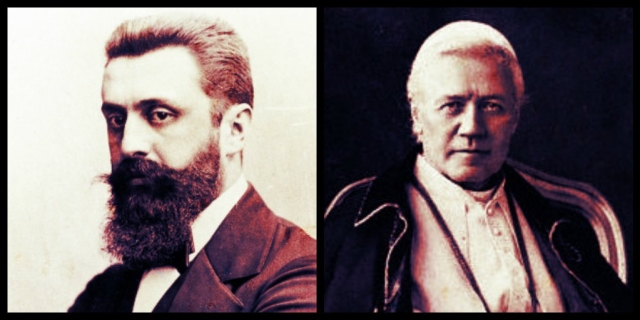The meeting came shortly after Herzl had met with Italian King Vittorio Emanuele III and just a few short months before the Zionist visionary would die. Although the King showed a keen interest in the Zionist movement and even said that one of his direct ancestors had been a co-conspirator of the false Jewish Messiah Shabbtai Tzvi, the Catholic Church at the time, specifically the Pope himself, did not buy what Herzl was trying to sell.
In 1904 Theodor Herzl asked Pope St. Pius X to support Zionism.
— BetterWisdomThanGold (@w4ytruthlife31_) October 2, 2018
“We cannot give approval to this movement. The Jews have not recognized our Lord, therefore we cannot recognize the Jewish people.”https://t.co/ZFEsggYpPj pic.twitter.com/WCLQWeuT3J
According to the diary of Herzl, being a Jew he did not feel compelled to kneel or kiss the hand of the Pope, which may have had a connection to the harsh words the Pope had for the Hungarian-Jewish leader. “We cannot give approval to this movement. We cannot prevent the Jews from going to Jerusalem but we could never sanction it. The earth of Jerusalem, if it was not always holy, has been made holy by the life of Jesus Christ. I as head of the Church cannot possibly say otherwise. The Jews have not recognized our Lord; we therefore cannot recognize the Jewish people.”
According to both Vatican records and Herzl’s diary, the Pope then continued and added that if Jews settle in Palestine the Church would make sure that there were churches and priests there to baptize them and convert them all to Catholicism.
Although he passed shortly later, Herzl’s Zionist vision and the attempts to make peace with the Catholic Church would live on. In 1948, after the declaration of independence by the State of Israel, the Catholic Church began to understand where it might have gone wrong. In 1965, the Church published Nostra Aetate, which rejects the long-leveled 'Blood-Libel' charge against the Jewish people on a collective level and the notion that all Jews are guilty of killing Jesus; they would also condemn all displays of antisemitism on behalf of the Catholic Church and the Christian faith.
2. …disputed, the Pope’s reply was blunt: “We cannot give approval to this movement. We cannot prevent the Jews from going to Jerusalem—but we could never sanction it. The soil of Jerusalem, if it was not always sacred, has been sanctified by the life of Jesus Christ. As the…
— Paul Kikos 🌐 (@PKikos) October 17, 2022
Nonetheless, the struggle against antisemitism in the church would continue into the 21st century, including a 2015 Vatical declaration calling for Catholics to work with Jews to fight antisemitism, rather than take part in it. As it stands, although traditional antisemitism does exist to some extent in the Catholic world, the Vatican maintains strong ties with Israeli and Palestinian leaders alike.


